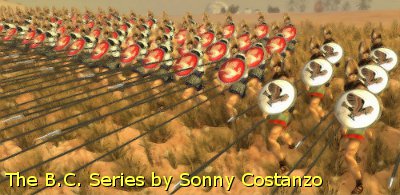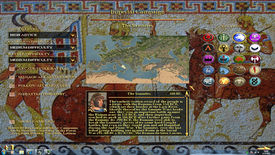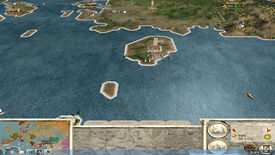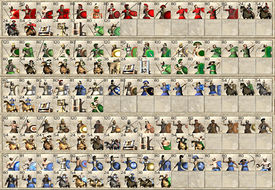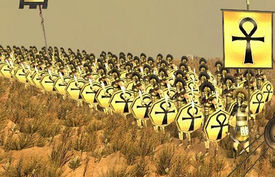B.C. Series
The B.C. Series is a mod which includes a great variety of campaigns. The mod leader is Sonny Costanzo, who is also the only modder who has been developing this mod. The mod is compatible with Rome: Total War. It has its own hosted forum at TWC.
Template:Mod Information Table (map)
Contents
- 1 History
- 2 Campaigns Features
- 3 Included Mods and modding elements
- 4 Mod team
- 5 Visual Material
- 6 External Links
History
The mod has seen very fast development, with many releases within 2011.
Campaigns Features
Samnium Calling Campaign
General Setting
The year is 310 B.C.
Important Factions
- Seleucid Empire
Antigonus orders Nicanor, one of his generals, to invade Babylonia from the east and his son Demetrius Poliorcetes to attack it from the west. Nicanor assembles a large force but it is surprised and defeated by Seleucus at the river Tigris, and his troops are either cut to pieces or defect to the enemy. Similarly, Demetrius Poliorcetes fails to oust Seleucus. Asia Minor Ptolemy attacks Cilicia, territory held by Antigonus. In Sicily The tyrant of Syracuse Agathocles escapes from the siege of the city by the Carthaginians and carries the war with the Carthaginians back into his enemy's territory. Rome deals with renewed trouble from the Etruscans, who are persuaded by the Samnites to cease their alliance with the Romans. Illyria The Autariatae disappears due to Celtic migrations.
- Etruscans
Etruscan expansion was focused both to the north beyond the Apennines and into Campania. Some small towns in the 6th century BC have disappeared during this time, ostensibly consumed by greater, more powerful neighbors. However, there exists no doubt that the political structure of the Etruscan culture was similar, albeit more aristocratic, to Magna Graecia in the south. The mining and commerce of metal, especially copper and iron, led to an enrichment of the Etruscans and to the expansion of their influence in the Italian peninsula and the western Mediterranean sea. Here their interests collided with those of the Greeks, especially in the 6th century BC, when Phoceans of Italy founded colonies along the coast of France, Catalonia and Corsica. This led the Etruscans to ally themselves with the Carthaginians, whose interests also collided with the Greeks. Around 540 BC, the Battle of Alalia led to a new distribution of power in the western Mediterranean Sea. Though the battle had no clear winner, Carthage managed to expand its sphere of influence at the expense of both the Etruscans and the Greeks. Etruria saw itself relegated to the northern Tyrrhenian Sea. From the first half of the 5th century BC they lost their south provinces (Campanian Etruria), the new international political situation meant the beginning of the Etruscan decline. In 480 BC, Etruria's ally Carthage was defeated by a coalition of Magna Graecia cities led by Syracuse. A few years later, in 474, Syracuse's tyrant Hiero defeated the Etruscans at the Battle of Cumae. Etruria's influence over the cities of Latium and Campania weakened, and it was taken over by Romans and Samnites. In the 4th century BC they lost their north provinces (Padanian Etruria), Etruria saw a Gallic invasion end its influence over the Po valley and the Adriatic coast. Meanwhile, Rome had started annexing Etruscan cities.
- Samnites
The earliest written record of the people is a treaty with the Romans from 354 BC, which set their border at the Liris River. Shortly thereafter the Samnite Wars broke out; they won an important battle against the Roman army in 321 BC, and their imperium reached its peak in 316 BC after further gains from the RomansSamnium was delimited by Latium in the north, by Lucania in the south, by Campania in the west and by Apulia in the east. The principal cities of the region were Bovaiamom, renamed Bovianum by Latins (today: Bojano or Boiano) and Malventum (Maloenton in Oscan), which was later renamed Beneventum by the Romans (today: Benevento). For most of their history the Samnites were landlocked, but during a brief period they controlled parts of both coasts of the Italian peninsula. The Samnites were composed of at least four tribes: the Pentri (the most important tribe, capital: Bovianum), the Caraceni (principal cities: Cluviae, the modern Casoli, and Juvanum, the ruins of which are spread between Torricella Peligna and Montenerodomo), the Caudini (capital: Caudium, today Montesarchio) and the Hirpini (Oscan for wolf; capital Beneventum), and later may have been joined by the Frentani (capital Larinum, the modern Larino). The federal capital of the League they formed was Bovianum, except for a short period between the 4th and 3rd centuries BC, when it was Aquilonia, destroyed by Romans in 293 BC, whose probable location today is modern Aquilonia, in Campania, province Avellino.
- Massilia
Marseille, which can be called the oldest city in France, was founded in 600 BC by Greeks from Phocaea as a trading port under the name Μασσαλία (Massalia; see also List of traditional Greek place names). The connection between Μασσαλία and the Phoceans is mentioned in Book I, 13 of the History of the Peloponnesian War by Thucydides. The precise circumstances and date of founding remain obscure, but nevertheless a legend survives. Protis, while exploring for a new trading outpost or emporion for Phocaea, discovered the Mediterranean cove of the Lacydon, fed by a freshwater stream and protected by two rocky promontories. Protis was invited inland to a banquet held by the chief of the local Ligurian tribe for suitors seeking the hand of his daughter Gyptis in marriage. At the end of the banquet, Gyptis presented the ceremonial cup of wine to Protis, indicating her unequivocal choice. Following their marriage, they moved to the hill just to the north of the Lacydon; and from this settlement grew Massalia. View from the Vieux-Port towards Notre-Dame-de-la-GardeMassalia was one of the first Greek ports in Western Europe, growing to a population of over 1000. It was the first settlement given city status in France. Facing an opposing alliance of the Etruscans, Carthage and the Celts, the Greek colony allied itself with the expanding Roman Republic for protection. This protectionist association brought aid in the event of future attacks, and perhaps equally important, it also brought the people of Massalia into the complex Roman market. The city thrived by acting as a link between inland Gaul, hungry for Roman goods and wine (which Massalia was steadily exporting by 500 BC)
- Antigonid Empire
The Antigonid dynasty (Greek: Δυναστεία των Αντιγονιδών) was a dynasty of Hellenistic kings descended from Alexander the Great's general Antigonus I Monophthalmus ("the One-eyed"). Succeeding the Antipatrid dynasty in much of Macedonia, Antigonus ruled mostly over Asia Minor and northern Syria. His attempts to take control of the whole of Alexander's empire Antigonus I Monophthalmus: Antigonus I Monophthalmus (Greek: Ἀντίγονος ὁ Μονόφθαλμος, "Antigonus the One-eyed", 382 BC – 301 BC), son of Philip from Elimeia, was a Macedonian nobleman, general, and satrap under Alexander the Great. During his early life he served under Philip II, and he was a major figure in the Wars of the Diadochi after Alexander's death, declaring himself king in 306 BC and establishing the Antigonid dynasty. After the war had been carried on with varying success from 315 to 311, peace was concluded, by which the government of Asia Minor and Syria was provisionally secured to Antigonus. This agreement was soon violated on the pretext that garrisons had been placed in some of the free Greek cities by Antigonus, and Ptolemy and Cassander renewed hostilities against him. Demetrius Poliorcetes, the son of Antigonus, wrested part of Greece from Cassander.
- Epirus
The Molossian Aeacidae dynasty managed to create the first centralized state in Epirus from about 370 BC onwards, expanding their power at the expense of rival tribes. The Aeacids allied themselves with the increasingly powerful kingdom of Macedon, in part against the common threat of Illyrian raids, and in 359 BC the Molossian princess Olympias, niece of Arybbas of Epirus, married King Philip II of Macedon. She was to become the mother of Alexander the Great. On the death of Arybbas, Alexander the Molossian, uncle of Alexander the Great of Macedon, succeeded to the throne with the title King of Epirus. In 334 BC, the time Alexander the Great crossed into Asia, Alexander I the Molossian lead an expedition in southern Italy in support of the Greek cities of Magna Graecia against the nearby Italian tribes and the emerging Roman Republic. After some successes on the battlefield, he was defeated by Rome and killed in battle c. 331 BC
The Way of the Epirote Campaign
General Setting
The Road to Messina-The First Panic War Campaign
- the 275 B.C. campaign ("Road to Messina-The First Punic War") and
Ashoka on the Map Campaign
- the 270 B.C. campaign ("Ashoka on the Map")
Campaigns to be released in the future
The following campaigns are under development and have not been released yet:
- the Alexandrian and post-Alexandrian campaign series (named "Rise of Hellenism"), which are to consist of:
- the 336 B.C. campaign ("Alexander Campaigns")
- the 300 B.C. campaign ("Diadochi Wars")
- the 280 B.C. campaign ("The Hellenistic Empires")
- the 250 B.C. campaign ("The Graeco-Bactrian Empire")
- the 190 B.C. campaign ("The Graeco-Indian Kingdoms")
- the 1450 B.C. campaign
Factions
310 B.C. Campaign
- Armenia
- Massilia
- Carthage
- The Antigonid Empire
- Egypt
- Gauls
- Germans
- The Greek Cities
- Epirus and the Italiote League
- Etruscans
- Samnites
- Macedon
- Numidia
- Parthia
- Pontus
- Scythia
- The Seleucid Empire
- Rome
- Spain
- Thrace
- Rebels
280 B.C. Campaign
- The Roman Republic
- Baktria
- Epirus
- Egypt
- The Seleucid Empire
- Carthage
- Parthia
- Gauls
- Germans
- Britons
- The Greek Cities
- S.P.Q.R.
- Macedon
- Pontus
- Armenia
- Dacia
- Numidia
- Scythia
- Spain
- Thrace
- Rebels
275 B.C. Campaign
- Rome
- Egypt
- The Seleucid Empire
- Carthage
- Parthia
- Gauls
- Germans
- Britons
- The Greek Cities
- Macedon
- Pontus
- Armenia
- Dacia
- Numidia
- Scythia
- Spain
- Thrace
- Rebels
270 B.C. Campaign
- The Roman Republic
- Graeco-Baktrians
- The Mauryan Empire
- Egypt
- The Seleucid Empire
- Carthage
- Parthia
- Gauls
- Germans
- Britons
- The Greek Cities
- Macedon
- Pontus
- Armenia
- Saba
- Numidia
- Scythia
- Spain
- Thrace
- Rebels
Included Mods and modding elements
- Aristea Soundtrack by rgex
- RS2 Environment
- Darth Formations by Darth Vader
- SPQR/HBO´s Rome Soundtrack
- Night Battles available
- No more burning oil by Dol Goldor
- Icons by the SPQR Team
- Music by the SPQR Team
- Textures: EB Team
- webbirds 270bc map mod
- Based on My_Mod Files for RTW 1.5 BI or Alex by Finch
- Neutralised senate by Makanyane (RTW BI and Alex)
- Mundus Magnus map by NGR
- Skymod by horsearcher
- Horses by Pinarius
- M2TW for the ground textures and sea textures
- Night Battles available
- No more burning oil by Dol Goldor
- Textures by Webbird and Warspite
- Textures by the Peninsula Italica Team
- Textures by Jounk33 from his outstanding Imperium Parsa 2 Mod
- Models and Textures by Dark Fenrir
- UI cards and textures for egypt by the SPQR Team
- Icons by Lusted
Mod team
Sonny Costanzo is the only developper of the mod.
Visual Material
External Links
The B.C. Series Hosted Forum at Total War Center
